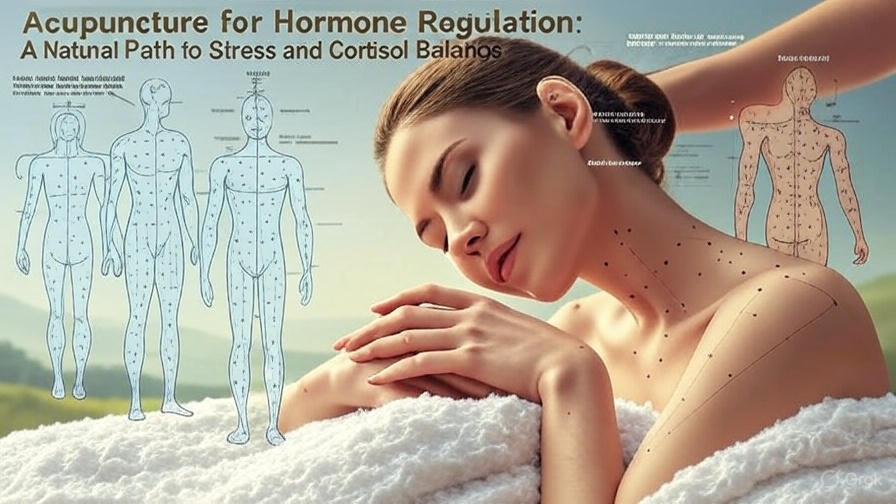Acupuncture for Hormone Regulation: Your Guide to a Calmer, More Balanced Life
In our fast-paced, modern world, stress has become an unwelcome and constant companion for many. The relentless demands of work, family, and personal life can leave us feeling perpetually on edge, a state that our bodies interpret as a constant threat. This is not just a mental or emotional feeling; it’s a profound physiological state orchestrated by our hormones, most notably, cortisol. High levels of cortisol, often dubbed the “stress hormone,” can wreak havoc on our physical and mental health. While conventional medicine offers solutions, an ancient practice is gaining renewed attention for its remarkable ability to restore balance: acupuncture.
This article delves deep into the fascinating relationship between acupuncture for hormone regulation, and its potential to help you manage stress and bring your cortisol levels back into a healthy equilibrium. We’ll explore the science, the real-world data, and the practical steps you can take to leverage this powerful therapeutic approach for a calmer, more resilient you.
The Modern Stress Epidemic: A Hormonal Imbalance
Before we explore the solution, let’s understand the problem. When we experience stress, our bodies activate the “fight or flight” response. The hypothalamus, a small but mighty region in our brain, signals the pituitary gland, which in turn signals the adrenal glands to release cortisol. This is a crucial, life-saving mechanism designed for short-term threats. In a primal context, this response would help us escape a predator. In our modern lives, however, it’s often triggered by a looming work deadline, a difficult conversation, or even just sitting in traffic.
The problem arises when this stress response becomes chronic. Constant cortisol production keeps our bodies in a state of high alert, leading to a cascade of negative health outcomes. Elevated cortisol is linked to weight gain, particularly around the abdomen, weakened immune function, high blood pressure, sleep disturbances, anxiety, and depression. It can disrupt other vital hormone systems, including those that regulate thyroid function, metabolism, and reproductive health. Simply put, chronic stress and high cortisol are silent saboteurs of our well-being.
The Science Behind Acupuncture and Cortisol
So, how can an ancient practice involving tiny needles address such a complex physiological problem? The mechanism is more scientific and well-researched than you might think. Acupuncture works by stimulating specific points on the body, which, according to Traditional Chinese Medicine (TCM), are located along pathways called meridians. From a biomedical perspective, these points are often found near nerve bundles, blood vessels, and fascia.
When an acupuncturist inserts a needle into one of these points, it triggers a response in the central nervous system. This stimulation sends signals to the brain, specifically to the hypothalamus and pituitary gland, the very same regions that orchestrate our stress response. By modulating the activity of these glands, acupuncture can help calm the hypothalamic-pituitary-adrenal (HPA) axis, the primary system responsible for managing stress.
Numerous studies have provided compelling evidence for this connection. For instance, a 2013 study published in the Journal of Endocrinology found that electroacupuncture, a variation of acupuncture that uses a small electric current, was effective in suppressing chronic stress-induced elevations in cortisol and other stress-related hormones in rats. While a study on rats is not the same as a human trial, it provides a strong foundation for understanding the biological pathways involved.
More human-focused research has also demonstrated positive outcomes. A 2014 study in the journal Evidence-Based Complementary and Alternative Medicine investigated the effects of acupuncture on women with symptoms of stress and anxiety. The participants who received acupuncture showed a significant reduction in their perceived stress levels and, importantly, a decrease in salivary cortisol levels compared to the control group. This tangible data provides powerful support for the efficacy of acupuncture for hormone regulation.
Beyond Cortisol: The Broader Hormonal Benefits
The benefits of acupuncture for hormone regulation extend far beyond just cortisol. The HPA axis is intricately linked to other endocrine systems. By calming the central stress response, acupuncture can have a ripple effect, positively influencing a range of hormonal functions.
- Thyroid Health: Chronic stress can disrupt the delicate balance of thyroid hormones. By reducing cortisol, acupuncture can help the thyroid gland function more efficiently, improving metabolism, energy levels, and mood.
- Insulin Regulation: High cortisol levels can lead to insulin resistance, a precursor to Type 2 diabetes. Acupuncture has been shown in some studies to help improve insulin sensitivity and glucose metabolism.
- Reproductive Health: Stress and high cortisol are notorious for disrupting menstrual cycles, affecting ovulation, and impacting fertility in both men and women. By restoring hormonal balance, acupuncture is a well-regarded complementary therapy in fertility clinics for its ability to regulate hormones like FSH, LH, and progesterone.
The beauty of acupuncture lies in its holistic approach. It doesn’t just target one hormone in isolation; it works to restore the body’s natural state of homeostasis, or balance. This is a fundamental principle of TCM, which views the body as an interconnected system.
The Acupuncture Experience: What to Expect
If you’re new to acupuncture, the idea of needles might seem intimidating. However, most people find the experience to be deeply relaxing and often fall asleep during a session. A typical session begins with a detailed consultation where the acupuncturist will ask about your health history, lifestyle, and specific concerns. This allows them to create a personalized treatment plan tailored to your unique needs.
The acupuncturist will then ask you to lie down comfortably on a treatment table. They will insert sterile, hair-thin needles into specific points. You may feel a slight pinch or a dull ache as the needle is inserted, but this sensation typically subsides quickly. The needles are usually left in for 20-30 minutes, during which you can simply lie still, breathe, and relax. Many people report feeling a profound sense of calm and well-being during and after their sessions.
The number of sessions needed varies depending on the individual and the severity of their condition. For chronic stress and hormonal imbalances, a series of treatments is often recommended to achieve lasting results. The cumulative effects of consistent acupuncture for hormone regulation are what ultimately lead to a more balanced and resilient HPA axis.
Integrating Acupuncture into a Holistic Stress Management Plan
While acupuncture is a powerful tool, it is most effective when integrated into a broader strategy for managing stress. Consider combining your acupuncture treatments with other healthy lifestyle choices:
- Mindfulness and Meditation: Practicing mindfulness or meditation for even a few minutes a day can help train your mind to be less reactive to stress.
- Regular Exercise: Physical activity is a proven stress reliever. It helps burn off excess adrenaline and cortisol and releases endorphins, natural mood boosters.
- Nutritious Diet: Eating a balanced diet rich in whole foods, healthy fats, and lean proteins provides the building blocks for healthy hormone production.
- Adequate Sleep: Prioritizing 7-9 hours of quality sleep per night is crucial for hormonal repair and restoration.
By taking a multi-faceted approach, you can create a robust support system for your body and mind. Acupuncture can be the anchor of this plan, providing the foundational balance your body needs to respond to stress in a healthier way. The journey to a calmer, more balanced life is a partnership between you and your healthcare providers.
Final Thoughts on Acupuncture for Hormone Regulation
The quest for health and wellness in the face of modern stress is a shared human experience. The promise of acupuncture for hormone regulation is not a quick fix, but a path to long-term, sustainable well-being. By harnessing the body’s innate ability to heal and self-regulate, acupuncture offers a powerful, natural alternative to managing chronic stress and high cortisol.
It is a time-tested practice that has earned its place in modern wellness conversations, supported by a growing body of scientific evidence and the real-life experiences of millions who have found relief. If you are struggling with the effects of stress and a feeling of being constantly “on,” exploring acupuncture for hormone regulation might be the key to unlocking a sense of peace, vitality, and hormonal harmony. Consult a qualified and certified acupuncturist to begin your journey toward a more balanced and resilient you.



